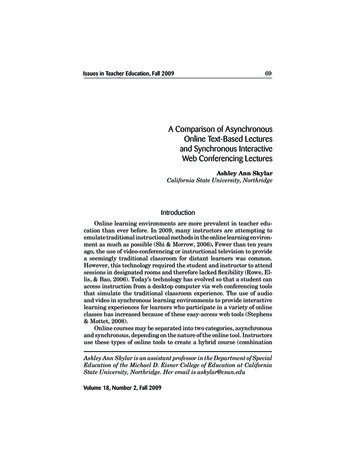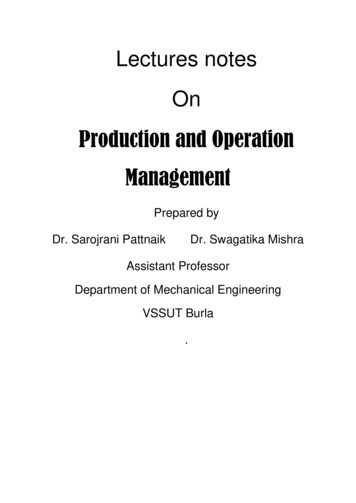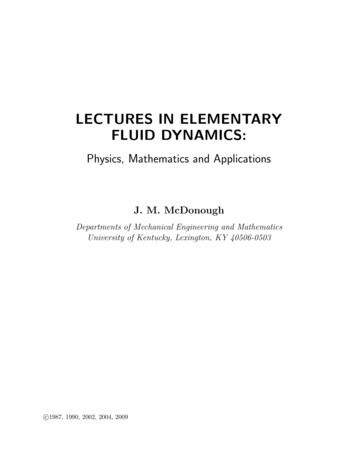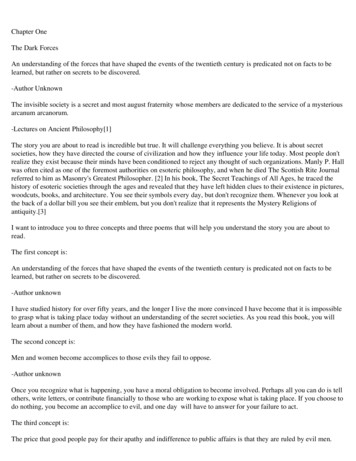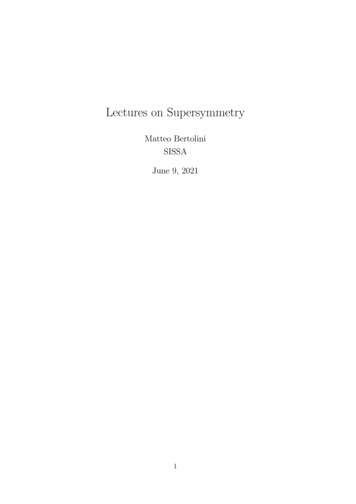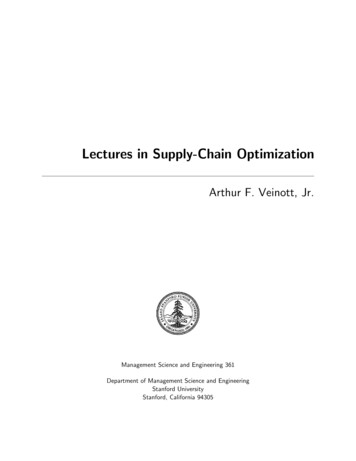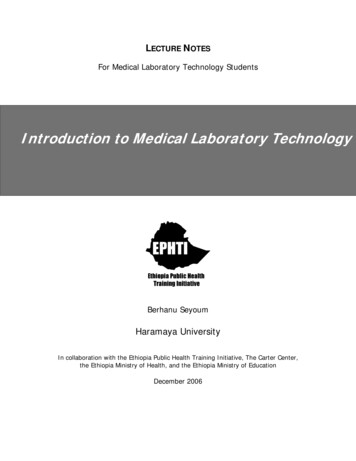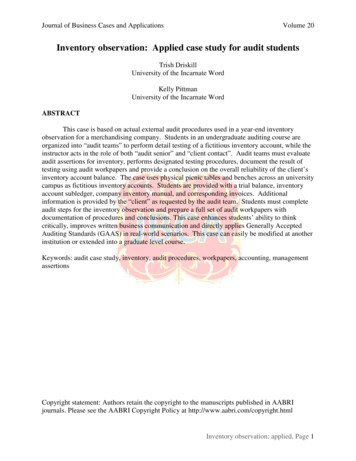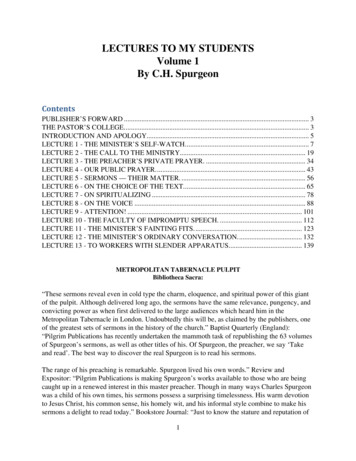
Transcription
LECTURES TO MY STUDENTSVolume 1By C.H. SpurgeonContentsPUBLISHER’S FORWARD . 3THE PASTOR’S COLLEGE. . 3INTRODUCTION AND APOLOGY. 5LECTURE 1 - THE MINISTER’S SELF-WATCH. 7LECTURE 2 - THE CALL TO THE MINISTRY. 19LECTURE 3 - THE PREACHER’S PRIVATE PRAYER. . 34LECTURE 4 - OUR PUBLIC PRAYER. . 43LECTURE 5 - SERMONS — THEIR MATTER. . 56LECTURE 6 - ON THE CHOICE OF THE TEXT. 65LECTURE 7 - ON SPIRITUALIZING . 78LECTURE 8 - ON THE VOICE . 88LECTURE 9 - ATTENTION! . 101LECTURE 10 - THE FACULTY OF IMPROMPTU SPEECH. . 112LECTURE 11 - THE MINISTER’S FAINTING FITS. . 123LECTURE 12 - THE MINISTER’S ORDINARY CONVERSATION. . 132LECTURE 13 - TO WORKERS WITH SLENDER APPARATUS. 139METROPOLITAN TABERNACLE PULPITBibliotheca Sacra:“These sermons reveal even in cold type the charm, eloquence, and spiritual power of this giantof the pulpit. Although delivered long ago, the sermons have the same relevance, pungency, andconvicting power as when first delivered to the large audiences which heard him in theMetropolitan Tabernacle in London. Undoubtedly this will be, as claimed by the publishers, oneof the greatest sets of sermons in the history of the church.” Baptist Quarterly (England):“Pilgrim Publications has recently undertaken the mammoth task of republishing the 63 volumesof Spurgeon’s sermons, as well as other titles of his. Of Spurgeon, the preacher, we say ‘Takeand read’. The best way to discover the real Spurgeon is to read his sermons.The range of his preaching is remarkable. Spurgeon lived his own words.” Review andExpositor: “Pilgrim Publications is making Spurgeon’s works available to those who are beingcaught up in a renewed interest in this master preacher. Though in many ways Charles Spurgeonwas a child of his own times, his sermons possess a surprising timelessness. His warm devotionto Jesus Christ, his common sense, his homely wit, and his informal style combine to make hissermons a delight to read today.” Bookstore Journal: “Just to know the stature and reputation of1
the author is sufficient without any man’s recommendation! Thousands give testimony to thevalue of Spurgeon’s sermons in their ministry and upon individual lives. His dual ministry, thatof the spoken and written word, is timeless, speaking of the perennial power of the Word of Godas it speaks to man at all times.” Moody Monthly: “One of the most remarkable undertakings ofreprinting rich Christian literature, long out of print, has been announced by Pilgrim Publicationsof Pasadena, Texas . . . I would say, without any hesitation at all, that these volumes(Metropolitan Tabernacle Pulpit) form the greatest collection of sermons by one minister of theWord of God that we have in the English language.” (Dr. Wilbur M. Smith). Christianity Today:“For those who were not privileged to be numbered among his (Spurgeon’s) congregation atNew Park Street Chapel or later at the Metropolitan Tabernacle, it is indeed fortunate that thesermons of this master of the pulpit were recorded on the printed page. Spurgeon’s sermons arefilled with the necessary ingredients of good preaching and have set standard rarely reached intoday’s pulpits it is indeed gratifying that this incomparable series of sermons is being madeavailable once again.” Sword of the Lord: “We are glad that Pilgrim Publications, in Pasadena,Texas, is now reprinting Spurgeon’s sermons. Previously, a selection of twenty volumes ofSpurgeon’s sermons was published widely, they are now out of print. However, these were onlyselected sermons from the whole. We are glad that all of Spurgeon’s sermons will now bereproduced just as originally published by Spurgeon in Spurgeon’s day.” Australian Baptist:“Above all else we commend Spurgeon because of the Biblical content of his sermons. Here issound doctrine, the doctrines of grace. Here is white-hot evangelism, and at the same timeevidence of the heart of a loving pastor. Preachers and evangelists will find inspiration for theirministry in these volumes.” New Life (Australia): “The republication of these volumes couldprove to be a powerful preservative for evangelical Christianity. These volumes complete andunabridged contain some of the finest preaching this world has ever heard. How much one wouldlike to say! The best thing is that you procure a copy and delve into its heart-warming andinspiring contents.” Evangelical Baptist (Canada): “Charles H. Spurgeon, by general agreement,was one of the great preachers of the ages. His weekly sermons were avidly read as they camefrom the publisher. Then, each year, the annual volume appeared under the title, ‘MetropolitanTabernacle Pulpit.’Those volumes are to be printed now just as they appeared from the presses in former time. Awell illustrated brochure, The Pictorial Life of C. H. Spurgeon, is worth more than the fifty centswhich it will cost you.” Prairie Overcomer: “Pilgrim Publications has launched what must be oneof the most ambitious reprint projects of the twentieth century. We refer to the republication ofC. H. Spurgeon’s Metropolitan Tabernacle Pulpit sermons in their original form, completelyunabridged.”2
PUBLISHER’S FORWARDThe Pastor’s College began with one student, Mr. T. W. Medhurst, who first contacted Spurgeonabout the matter of salvation. After his conversion, Medhurst wanted to study for the ministryunder Spurgeon.Spurgeon first assigned him to Mr. C. H. Hosken as his teacher, then later Mr. George Rogersbecame the tutor and the small beginning developed into a college for ministerial students. Moreand more students enrolled, and the Pastor’s College became widely known. With the help ofSpurgeon, its library became a great asset to the student body.The early tutors of the college included James Spurgeon, David Gracey, Archibald Ferguson, andW. R. Selway.A later staff was composed of Fergusson, Rogers, Gracey, and F. G. Merchant.Lectures were of course given in class rooms, but there was also “the Question Oak” a large treeat Mr. Spurgeon’s residence. Often the students would gather under the tree and ask questions ofSpurgeon, and he would give the answers.On Friday afternoon, the students were usually asked to exhibit their own ability as preachersand that without prior knowledge of the subject matter.Spurgeon called upon a student to give a message on Zaccheus. The student arose and said:“Zaccheus was little of stature, so am I. Zaccheus was up a tree, so am I. Zaccheus came down,so will I.” The students, as well as Mr. Spurgeon, applauded the “ingenious” performance.The College had an annual conference at which time many of the former students would gatherfor fellowship and preaching.THE PASTOR’S COLLEGE.THE Pastors’ College was commenced upon a very small scale in the year 1856. Since that dateit has educated and sent forth into the ministry not less than three hundred and fifty men, ofwhom, after deductions by death and other causes, about three hundred remain in the Baptistdenomination, preaching the gospel of Jesus Christ. In addition to this, a far larger number ofmen receive gratuitous education in the evening, such as may fit them to be city missionaries,colporteurs, or useful private Christians.The institution receives no man in order to make him a preacher, but it is established to help inthe further education of brethren who have been preaching with some measure of success for two3
years at the least. Many men of earnest spirit and established Christian character are hindered intheir efforts to do good by the slenderness of their knowledge. Conscious of their own defects,they endeavor to improve themselves, but the absence of a guide, their need of books, and theirscanty time, all prevent their making progress. These are the men whom the Pastors’ Collegewelcomes.Men in whom piety, zeal, and the indwelling Spirit are to be found need not fear refusal at ourdoors on account of poverty, if they possess those gifts of utterance which are essential to thepreacher.The College aims at training preachers rather than scholars. To develop the faculty of readyspeech, to help them to understand the word of God, and to foster the spirit of consecration,courage, and confidence in God, are objects so important that we put all other matters into asecondary position. If a student should learn a thousand things, and yet fail to preach the gospelacceptably, his College course will have missed its true design.Should the pursuit of literary prizes and the ambition for classical honors so occupy his mind asto divert his attention from his life work, they are perilous rather than beneficial. To be wise towin souls is the wisdom ministers should possess.In the Pastors’ College definite doctrines are held and taught. We hold by the doctrines of graceand the old orthodox faith, and have no sympathy with the countless theological novelties of thepresent day, which are novelties only in outward form: in substance they are repetitions of errorsexploded long ago. Our standing in doctrinal matters is well known, and we make no professionof latitudinarian charity, yet we find no failure in the number of earnest spirits who rally to ourstandard, believing that in truth alone, can true freedom be found.The support of the College is derived from the free-will offerings of the Lord’s people. We haveno roll of subscribers, although many friends send us aid at regular intervals. Our confidence isthat God will supply all our means, and he has always done so hitherto. The President has neverderived a farthing from the work for himself in any shape, but on the contrary delights to give tothe work all that he can, both of money and gratis service; and therefore he the more confidentlyappeals to others to assist him in maintaining the Institution. No work can possibly confer agreater benefit upon mankind than the training of ministers whom God has chosen, for aroundthem spring up churches, schools, and all the agencies of religion and philanthropy. As we arecommanded to pray for laborers in the Lord’s harvest, so are we bound to prove the honesty ofour prayers by our actions.At least 100 is required every week to carry on the work.C. H.SPURGEON, Nightingale Lane , Clapham, Surrey.4
INTRODUCTION AND APOLOGY.IN reply to many requests from those ministers who in their student days listened to my lectures,I submit a selection to the press. This, however, I cannot do without an apology, for theseaddresses were not originally prepared for the public eye, and are scarcely presentable forcriticism.My College lectures are colloquial, familiar, full of anecdote, and often humorous: they arepurposely made so, to suit the occasion. At the end of the week I meet the students, and findthem weary with sterner studies, and I judge it best to be as lively and interesting in myprelections as I well can be. They have had their fill of classics, mathematics, and divinity, andare only in a condition to receive something which will attract and secure their attention, and firetheir hearts. Our reverend tutor, Mr. Rogers, compares my Friday work to the sharpening of thepin: the fashioning of the head, the straightening, the laying on of the metal and the polishinghave been done during the week, and then the process concludes with an effort to give point andsharpness. To succeed in this the lecturer must not be dull himself, nor demand any great effortfrom his audience.I am as much at home with my young brethren as in the bosom of my family, and therefore speakwithout restraint. Generous minds will take this into account in reading these lectures, and I shallhope that all who favor me with their criticisms will be of that noble order.Possibly caustic remarks may be made upon my frequent references to myself, my own methodsof procedure, and personal reminiscences. These also were intentional. I have purposely given analmost autobiographical tinge to the whole, because my own experience, such as it is, is the mostoriginal contribution which I can offer, and, with my own students, quite as weighty as any otherwithin my reach. It would have been impossible for me to quote the experiences of other men ifthey had not been bold enough to record them, and I make an honest attempt to acknowledge mydebt to my greater predecessors by writing down my own. Whether this arises from egotism ornot, each reader shall decide according to the sweetness or acidity of his own disposition. Afather is excused when he tells his sons his own life-story and finds it the readiest way to enforcehis maxims; the old soldier is forgiven when he “shoulders his crutch, and shows how fieldswere won;” I beg that the license which tolerates these may, on this occasion, be extended to me.It would have saved me much labor had I reserved these lectures for redelivery to newcompanies of freshmen, and I am conscious of no motive in printing them but that of desiring tokeep my counsels alive in the memories of those who heard them years ago, and impressingthem upon others who dwell beyond the precincts of our class-room. The age has becomeintensely practical, and needs a ministry not only orthodox and spiritual, but also natural inutterance, and practically shrewd. Officialism is sick unto death; life is the true heir to success,and is coming to its heritage. Mannerisms, pomposity’s, and proprieties, once so potent in thereligious world, are becoming as obsolete in the reverence of men as those gods of high Olympusfor whom in past ages poets tuned their lyres, and sculptors quickened marble into beauty. Truthand life must conquer, and their victory is nearest when they cease to be encumbered with the5
grave clothes of conventionalism and pretense. It is delicious to put one’s foot through the lathand plaster of old affectations, to make room for the granite walls of reality. This has been amain design with me, and may God send success to the effort.The solemn work with which the Christian ministry concerns itself demands a man’s all, and thatall at its best. To engage in it half-heartedly is an insult to God and man. Slumber must forsakeour eyelids sooner than men shall be allowed to perish. Yet we, are all prone to sleep as doothers, and students, among the rest, are apt to act the part of the foolish virgins; therefore have Isought to speak out my whole soul, in the hope that I might not create or foster dullness inothers. May He in whose hand are the churches and their pastors bless these words to youngerbrethren in the ministry, and if so I shall count it more than a full reward, and shall gratefullypraise the Lord.Should this publication succeed, I hope very soon to issue in similar form a work uponCommenting, containing a full catalogue of Commentaries, and also a second set of lectures. Ishall be obliged by any assistance rendered to the sale, for the price is unremunerative, andpersons interested in our subjects are not numerous enough to secure a very large circulation;hence it is only by the kind aid of all appreciating friends that I shall be able to publish the rest ofthe contemplated series.6
LECTURE 1 THE MINISTER’S SELF WATCH.“Take heed unto thyself, and unto the doctrine.” — 1 Timothy 4:16.EVERY workman knows the necessity of keeping his tools in a good state of repair, for “if theiron be blunt, and he do not whet the edge, then must he put to more strength.” If the workmanlose the edge from his adz, he knows that there will be a greater draught upon his energies, or hiswork will be badly done. Michael Angelo, the elect of the fine arts, understood so well theimportance of his tools, that he always made his own brushes with his own hands, and in this hegives us an illustration of the God of grace, who with special care fashions for himself all trueministers. It is true that the Lord, like Quintin Matsys in the story of the Antwerp well-cover, canwork with the faultiest kind of instrumentality, as he does when he occasionally makes veryfoolish preaching to be useful in conversion; and he can even work without agents, as he doeswhen he saves men without a preacher at all, applying the word directly by his Holy Spirit; butwe cannot regard God’s absolutely sovereign acts as a rule for our action. He may, in his ownabsoluteness, do as pleases him best, but we must act as his plainer dispensations instruct us; andone of the facts which is clear enough is this, that the Lord usually adapts means to ends, fromwhich the plain lesson is, that we shall be likely to accomplish most when we are in the bestspiritual condition; or in other words, we shall usually do our Lord’s work best when our giftsand graces are in good order, and we shall do worst when they are most out of trim. This is apractical truth for our guidance, when the Lord makes exceptions, they do but prove the rule.We are, in a certain sense, our own tools, and therefore must keep ourselves in order. If I want topreach the gospel, I can only use my own voice; therefore I must train my vocal powers. I canonly think with my own brains, and feel with my own heart, and therefore I must educate myintellectual and emotional faculties. I can only weep and agonize for souls in my own renewednature, therefore must I watchfully maintain the tenderness which was in Christ Jesus. It will bein vain for me to stock my library, or organize societies, or project schemes, if I neglect theculture of myself; for books, and agencies, and systems, are only remotely the instruments of myholy calling; my own spirit, soul, and body, are my nearest machinery for sacred service; myspiritual faculties, and my inner life, are my battle ax and weapons of war. M’Cheyne, writing toa ministerial friend, who was traveling with a view to perfecting himself in the German tongue,used language identical with our own: — “I know you will apply hard to German, but do notforget the culture of the inner man — I mean of the heart. How diligently the cavalry officerkeeps his saber clean and sharp; every stain he rubs off with the greatest care. Remember you areGod’s sword, his instrument — I trust, a chosen vessel unto him to bear his name. In greatmeasure, according to the purity and perfection of the instrument, will be the success. It is notgreat talents God blesses so much as likeness to Jesus. A holy minister is an awful weapon in thehand of God.”7
For the herald of the gospel to be spiritually out of order in his own proper person is, both tohimself and to his work, a most serious calamity; and yet, my brethren, how easily is such an evilproduced, and with what watchfulness must it be guarded against! Traveling one day by expressfrom Perth to Edinburgh, on a sudden we came to a dead stop, because a very small screw in oneof the engines — every railway locomotive consisting virtually of two engines — had beenbroken, and when we started again we were obliged to crawl along with one piston-rod at workinstead of two. Only a small screw was gone, if that had been right the train would have rushedalong its iron road, but the absence of that insignificant piece of iron disarranged the whole. Atrain is said to have been stopped on one of the United States’ railways by flies in the greaseboxes of the carriage wheels. The analogy is perfect; a man in all other respects fitted to beuseful, may by some small defect be exceedingly hindered, or even rendered utterly useless.Such a result is all the more grievous, because it is associated with the gospel, which in thehighest sense is adapted to effect the grandest results. It is a terrible thing when the healing balmloses its efficacy through the blunderer who administers it. You all know the injurious effectsfrequently produced upon water through flowing along leaden pipes; even so the gospel itself, inflowing through men who are spiritually unhealthy, may be debased until it grows injurious totheir hearers. It is to be feared that Calvinistic doctrine becomes most evil teaching when it is setforth by men of ungodly lives, and exhibited as if it were a cloak for licentiousness; andArminianism, on the other hand, with its wide sweep of the offer of mercy, may do most seriousdamage to the souls of men, if the careless tone of the preacher leads his hearers to believe thatthey can repent whenever they please; and that, therefore, no urgency surrounds the gospelmessage. Moreover, when a preacher is poor in grace, any lasting good which may be the resultof his ministry, will usually be feeble and utterly out of proportion with what might have beenexpected. Much sowing will be followed by little reaping; the interest upon the talents will be inappreciably small. In two or three of the battles which were lost in the late American war, theresult is said to have been due to the bad gunpowder which was served out by certain “shoddy”contractors to the army, so that the due effect of a cannonade was not produced. So it may bewith us. We may miss our mark, lose our end and aim, and waste our time, through notpossessing true vital force within ourselves, or not possessing it in such a degree that God couldconsistently bless us. Beware of being “shoddy” preachers. IT SHOULD BE ONE OF OURFIRST CARES THAT WE OURSELVES BE SAVED MEN.That a teacher of the gospel should first be a partaker of it is a simple truth, but at the same timea rule of the most weighty importance. We are not among those who accept the apostolicalsuccession of young men simply because they assume it; if their college experience has beenrather vivacious than spiritual, if their honors have been connected rather with athletic exercisesthan with labors for Christ, we demand evidence of another kind than they are able to present tous. No amount of fees paid to learned doctors, and no amount of classics received in return,appear to us to be evidences of a call from above. True and genuine piety is necessary as the firstindispensable requisite; whatever “call” a man may pretend to have, if he has not been called toholiness, he certainly has not been called to the ministry. “First be trimmed thyself, and thenadorn thy brother,” say the rabbins. “The hand,” saith Gregory, “that means to make anotherclean, must not itself be dirty.” If your salt be unsavory how can you season others?8
Conversion is a sine qua non in a minister. Ye aspirants to our pulpits, “ye must be born again.”Nor is the possession of this first qualification a thing to be taken for granted by any man, forthere is very great possibility of our being mistaken as to whether we are converted or not.Believe me, it is no child’s play to “make your calling and election sure.” The world is full ofcounterfeits, and swarms with panderers to carnal self-conceit, who gather around a minister asvultures around a carcass. Our own hearts are deceitful, so that truth lies not on the surface, butmust be drawn up from the deepest well. We must search ourselves very anxiously and verythoroughly, lest by any means after having preached to others we ourselves should be castaways.How horrible to be a preacher of the gospel and yet to be un-converted!Let each man here whisper to his own inmost soul, “What a dreadful thing it will be for me if Ishould be ignorant of the power of the truth which I am preparing to proclaim!” Unconvertedministry involves the most unnatural relationships. A graceless pastor is a blind man elected to aprofessorship of optics, philosophizing upon light and vision, discoursing upon anddistinguishing to others the nice shades and delicate blendings of the prismatic colors, while hehimself is absolutely in the dark! He is a dumb man elevated to the chair of music; a deaf manfluent upon symphonies and harmonies! He is a mole professing to educate eaglets; a limpetelected to preside over angels. To such a relationship one might apply the most absurd andgrotesque metaphors, except that the subject is too solemn. It is a dreadful position for a man tostand in, for he has undertaken a work for which he is totally, wholly, and altogether unqualified,but from the responsibilities of which this unfitness will not screen him, because he willfullyincurred them. Whatever his natural gifts, whatever his mental powers may be, he is utterly outof court for spiritual work if he has no spiritual life; and it is his duty to cease the ministerialoffice till he has received this first and simplest of qualifications for it.Unconverted ministry must be equally dreadful in another respect. If the man has nocommission, what a very unhappy position for him to occupy!What can he see in the experience of his people to give him comfort? How must he feel when hehears the cries of penitents; or listens to their anxious doubts and solemn fears? He must beastonished to think that his words should be owned to that end! The word of an unconverted manmay be blessed to the conversion of souls, since the Lord, while he disowns the man, will stillhonor his own truth. How perplexed such a man must be when he is consulted concerning thedifficulties of mature Christians! In the pathway of experience, in which his own regeneratehearers are led, he must feel himself quite at a loss. How can he listen to their deathbed joys, orjoin in their rapturous fellowships around the table of their Lord?In many instances of young men put to a trade which they cannot endure, they have run away tosea sooner than follow an irksome business; but where shall that man flee who is apprenticed forlife to this holy calling, and yet is a total stranger to the power of godliness? How can he dailybid men come to Christ, while he himself is a stranger to his dying love? O sirs, surely this must9
be perpetual slavery. Such a man must hate the sight of a pulpit as much as a galley-slave hatesthe oar.And how unserviceable such a man must be. He has to guide travelers along a road which he hasnever trodden, to navigate a vessel along a coast of which he knows none of the landmarks! He iscalled to instruct others, being himself a fool. What can he be but a cloud without rain, a treewith leaves only. As when the caravan in the wilderness, all athirst and ready to die beneath thebroiling sun, comes to the long desired well, and, horror of horrors! finds it without a drop ofwater; so when souls thirsting after God come to a graceless ministry, they are ready to perishbecause the water of life is not be found. Better abolish pulpits than fill them with men who haveno experimental knowledge of what they teach.Alas! the unregenerate pastor becomes terribly mischievous too, for of all the causes whichcreate infidelity, ungodly ministers must be ranked among the first. I read the other day, that nophase of evil presented so marvelous a power for destruction, as the unconverted minister of aparish, with a 1200 organ, a choir of ungodly singers, and an aristocratic congregation.It was the opinion of the writer, that there could be no greater instrument for damnation out ofhell than that. People go to their place of worship and sit down comfortably, and think they mustbe Christians, when all the time all that their religion consists in, is listening to an orator, havingtheir ears tickled with music, and perhaps their eyes amused with graceful action and fashionablemanners; the whole being no better than what they hear and see at the opera — not so good,perhaps, in point of aesthetic beauty, and not an atom more spiritual. Thousands arecongratulating themselves, and even blessing God that they are devout worshippers, when at thesame time they are living in an unregenerate Christless state, having the form of godliness, butdenying the power thereof. He who presides over a system which aims at nothing higher thanformalism, is far more a servant of the devil than a minister of God.A formal preacher is mischievous while he preserves his outward equilibrium, but as he iswithout the preserving balance of godliness, sooner or later he is almost, sure to make a trip inhis moral character, and what a position is he in then! How is God blasphemed, and the gospelabused!Terrible is it to consider what a death must await such a man! and what must be his aftercondition! The prophet pictures the king of Babylon going down to hell, and all the kings andprinces whom he had destroyed, and whose capitals he had laid waste, rising up from their placesin Pandemonium, and saluting the fallen tyrant with the cutting sarcasm, “Art thou become likeunto us?” And cannot you suppose a man who has been a minister, but who has lived withoutChrist in his heart, going down to hell, and all the imprisoned spirits who used to hear him, andall the ungodly of his parish rising up and saying to him in bitter tones, “Art thou also become aswe are? Physician, didst thou not heal thyself? Art thou who claimed to be a shining light castdown into the darkness for ever?” Oh! if one must be lost, let it not be in this fashion! To be lostunder
The range of his preaching is remarkable. Spurgeon lived his own words.” Review and Expositor: “Pilgrim Publications is making Spurgeon’s works available to those who are being caught up in a renewed interest in this master preacher. Though in many ways Charles Spurgeon was a child of his own tim
